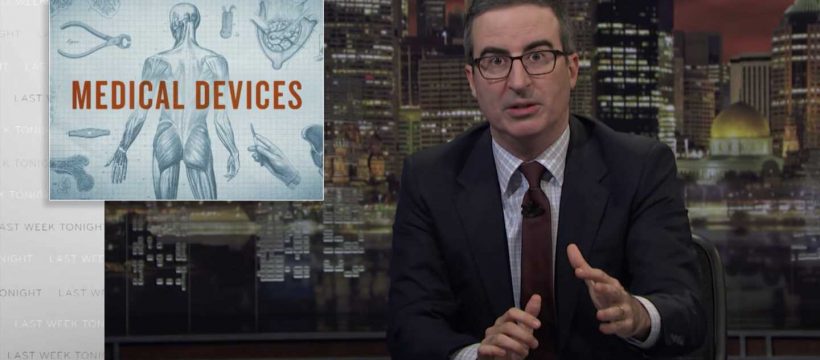John Oliver warned against the dangers of medical devices on Last Week Tonight, lobbying for a more transparent approval process for products like surgical mesh and hip replacements. “The medical device industry is huge,” he said on Sunday’s main segment. “They constitute a $156 billion market in the U.S., and more people have one than you might think. About 32 million Americans — that’s one in 10 — have at least 10 medical deice implanted in their bodies. That’s right — all these years we’ve been waiting anxiously for the robot apocalypse, and it turns out the robot apocalypse was inside us the whole time.”
These devices can help people, but the risks are often enormous. A November 2018 report from the Internal Consortium of Investigative Journalists discovered “more than 80,000 deaths and 1.7 million injuries possibly linked to medical devices in the past decade.” Equally shocking, many of these products are not even tested in a clinical trial before being implanted in patients.
Related
John Oliver: How to Fix America's Outdated Death Investigation System
John Oliver, Bill Nye Explain Climate Change: 'The Planet's on F-cking Fire'
The host offered a brief synopsis of the regulatory process, noting that one essentially didn’t exist until the 1970s, when Congress passed a law giving the FDA authority to approve medial devices. “You might assume that, on the basis of that, every single device you see is FDA-approved,” he said. “But in fact, far more of them are something called ‘FDA-cleared.’ And that is a distinction with a big difference because ‘FDA-cleared’ is a much lower bar to clear.”
In order to avoid stifling innovation, the FDA created a system called the 501(k) pathway, which allowed companies to avoid thorough testing for devices that are “substantially similar to one that had come before.” But this also created a dangerous loophole: As of 2017, Oliver reported, over 80 percent of medical devices are cleared through that system, including around 400 implanted devices per year. In this diluted process, products can be considered similar to other products, dating back for decades — to the point where the similarities become blurry.
In 2018, the company DePuy was cleared for a hip replacement that used a ball and socket made from metal; this product was cleared due to “substantial equivalence” to six previous devices, and those were cleared because of other similarities, dating back to 1975 — even though some of those had been removed from the marked by manufacturers due to high failure rates. DePuy’s metal-on-metal hips began to degrade through wear and tear, and its parent company has spent over $3 billion in settling thousands of lawsuits.
Oliver offered another example of approval-gone-wrong: surgical mesh. This device — a mainstay of TV commercials from personal injury lawyers — is implanted in the tissue, which heals around it and seals it in, making it difficult to remove without damaging the surrounding tissue and organs. For many patients, including those with vaginal mesh, it’s also led to debilitating pain.
“The good news is that the FDA recently ordered vaginal mesh manufacturers to stop selling their product,” Oliver said. “And as for metal-on-metal hips, going forward they wont be ‘FDA-cleared.’ They’ll have to go through the much more rigorous process that gets you ‘FDA-approved. It requires that a high-risk device be tested on humans.” However, the FDA relies on manufacturers to perform their own — often limited or misleading — clinical testing.
“The big question is, ‘How can you know if a device is potentially harmful?’” Oliver asked. “And unfortunately, good information is actually very difficult to find.” A 2012 New England Journal of Medicine study estimated that less than half of one percent of medical device failures are even reported to the FDA — “which, when you think about it,” he said, “is genuinely remarkable. One hundred percent of rude waiters are reported to Yelp, and those aren’t killing anybody.”
In 2011, the Institute of Medicine of the National Academies concluded that that the 501(k) clearance process should be replaced by a “new regulatory framework … based on sound science.” And Oliver concurred: “That framework does not to be so strict that innovation is stifled — just not to lax that people are getting needlessly hurt,” he said. “At the very least, you would hurt that implanted devices would undergo clinical testing before being put inside of you.”
Until the current system is revised, patients are often forced to be their own advocates: researching products themselves and asking thorough questions. Last Week Tonight hammered home this sad reality with a fake ad starring Jane Krakowski (30 Rock, Unbreakable Kimmy Schmidt) in an injury lawyer-styled ad warning against medical devices.
“Attention!” she says in the clip. “If you or a loved one are thinking about getting an implanted medical device, you may want to listen the fuck up! … Basically treat medical devices like guys who have played Batman: Some are great, but new ones aren’t necessarily better, and there are a few you definitely want to let inside your body.”
Source: Read Full Article

